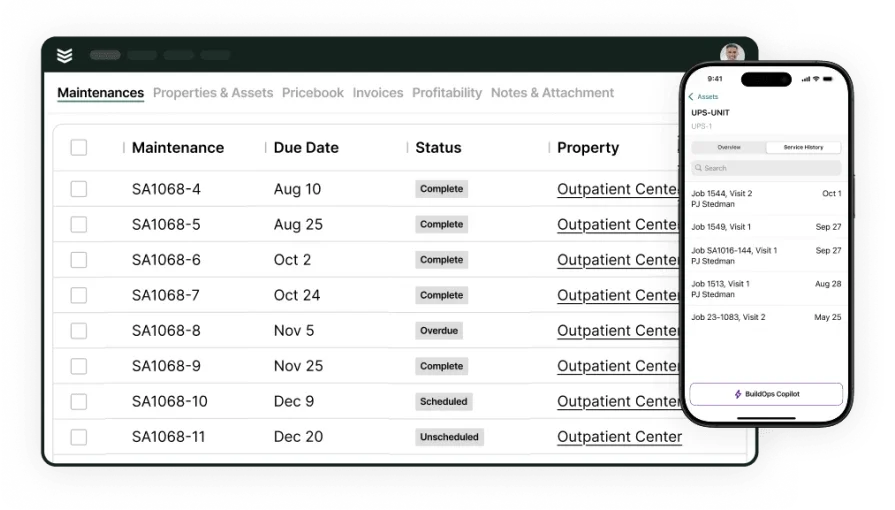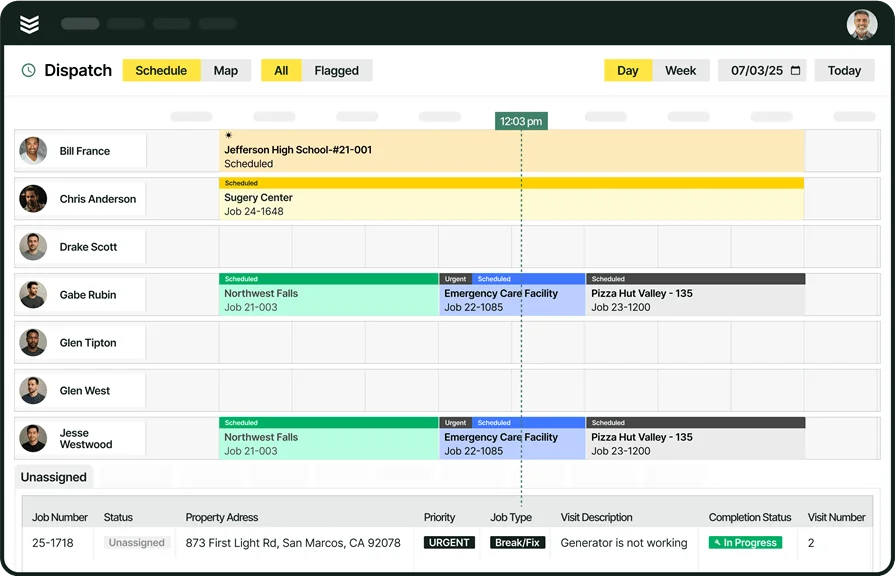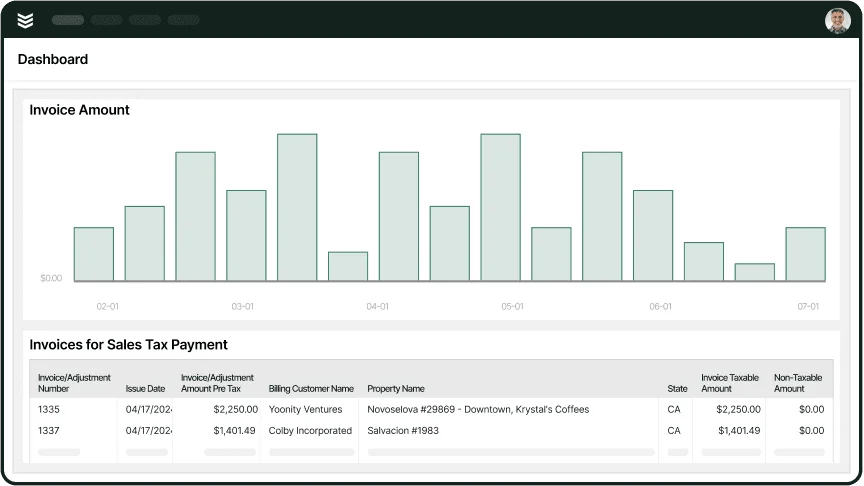When your operation spans hundreds of employees, dozens of job sites, and nonstop service calls, you can’t afford guesswork. That’s why enterprise field service management software is a must-have—not a nice-to-have. It gives large contractors the ability to coordinate complex field teams, track work in real time, and cut down on the chaos that kills profit margins. It’s also how the best commercial shops are locking in long-term clients and crushing SLAs.
But before you start hunting down vendors, it’s worth learning what makes these platforms tick. In this guide, we’ll break down what enterprise-level FSM software actually looks like, which features matter, and how to choose a platform for your field service management—not just your budget.
Here’s what we’ll cover:
- Choosing the right field service management software for your enterprise business
- 6 key features to look for in an enterprise field management service software
- 5 best enterprise field service management software
- 7 benefits of using an FSM software for your enterprise business
- 4 important enterprise field service management software FAQs answered
Coordinating hundreds of techs and job sites gets messy fast. Before you invest in field service software, make sure it’s ready to handle the real challenges that come with running a large-scale operation.
Choosing the right field service management software for your enterprise business
Before diving into feature lists or price tags, you need to know what you’re solving for. Large-scale operations require tools that match the complexity and volume of enterprise work. Here’s where to start:
- Scalability to match your operations - Are we supporting a handful of techs or several hundred? Can this platform handle high-volume scheduling, dispatching, and reporting across multiple regions or branches?
- Integration with existing systems - Will it connect with our ERP, CRM, or accounting tools without constant workarounds? Does it support API access and integrations we actually use?
- Data security and compliance - How does the software protect sensitive job, customer, and asset data? Can it meet our compliance standards (HIPAA, SOC 2, etc.)?
- Real-time visibility and control - Can operations leads see job statuses and technician locations in real time? Will it help dispatchers reroute techs based on what’s happening in the field right now?
- Features - Which features actually support the way our teams work across departments? Are advanced tools like route optimization, mobile checklists, or asset tracking included? What’s customizable without needing dev support?
Knowing what to ask is one thing—knowing what to demand from your software is another. Once you’ve nailed down your priorities, it’s time to look at the features that actually move the needle for enterprise teams.
6 key features to look for in an enterprise field management service software
Coordinating hundreds of techs across multiple branches, projects, and service zones takes more than spreadsheets and good intentions. Enterprise field service contractors need FSM software that helps them adapt fast, manage risk, and maintain visibility across every layer of operations.
The stakes are higher, the workloads heavier, and the customer expectations tougher. One missed job or tech delay can cost thousands—or worse, damage a hard-earned client relationship.
Here are the six features that make or break software at this scale:
1. Mobile app purpose-built for the field
Enterprise field teams don’t work behind desks—they’re on rooftops, in mechanical rooms, or crawling through tight spaces. They need a mobile tool designed for those conditions. A strong mobile app gives techs instant access to job info, service history, forms, and photo uploads—all in one place. It keeps everything synced, even across long job chains and multi-day service calls.
Say your tech is responding to a critical HVAC outage at a major hospital campus. They’re dealing with legacy systems, strict access rules, and real-time pressure. With a strong field service tech mobile app, they can pull up asset history, snap before-and-after photos, log notes on the fly, and move on to the next job—all without calling back to the office.
2. Smart scheduling that updates in real time
At the enterprise level, scheduling isn’t just about time slots—it’s about coordination across crews, regions, and job types. Smart scheduling tools help managers assign techs based on skill, location, availability, and priority. It’s especially useful when emergencies hit or jobs run long. With real-time updates, schedulers can pivot fast and keep everyone informed.
For instance, if one of your crews gets held up at a government facility due to a security delay, the rest of the day’s jobs don’t need to fall apart. With field service scheduling tools, you can instantly reshuffle appointments, notify customers, and reroute nearby techs to fill the gap.
3. Real-time dispatch board with GPS and live status
Dispatchers need to know where their techs are and what they’re working on—without making ten phone calls. A live dispatch board tied to GPS gives them that visibility. It shows who’s available, what’s running behind, and how the day is actually unfolding in the field. That’s gold for rerouting work, reacting to high-priority calls, and reducing downtime.
Consider an enterprise-level plumbing contractor servicing large residential complexes across multiple cities. Midday, one tech finishes early while another is stuck in traffic en route to a rush job. With real-time dispatching tools in FSM software, the dispatcher sees the change and reassigns the job in seconds—keeping things moving and clients happy.
4. Accurate quoting built for high-volume and complex service work
Large service businesses don’t send one tech to one job—they manage high-volume quoting across ongoing contracts, multi-trade scopes, and compliance-heavy environments. A quoting tool that supports standardized templates, pricing catalogs, and on-the-fly adjustments is essential. Bonus if it works straight from the field without needing office support.
Let’s say your team is retrofitting HVAC systems in a 30-story office tower. Midway through, your tech uncovers outdated ductwork that wasn’t in the original scope. With a quoting tool inside enterprise field service management software, they can build and send a change order on-site—using pre-approved pricing—so the job keeps moving without chasing signatures or paperwork back at HQ.
5. CRM that tracks every location, asset, and contact
Enterprise clients don’t just have one address. They’ve got dozens of locations, each with different points of contact, service records, and maintenance histories. A powerful CRM gives your team access to all of it—fast. From dispatchers to techs, everyone needs to know what was done, who signed off, and what’s due next.
Let’s say your electrical crew services hundreds of retail sites for a nationwide chain. A store manager calls in with a lighting issue, but the job notes are from two years ago. Instead of digging through emails, your team uses CRM inside enterprise field service software to pull up every job at that location—plus warranty info, site contacts, and asset history. You’re back on track in seconds.
6. Field-ready invoicing and payment collection
Big teams can’t afford bottlenecks at the finish line. Techs need the ability to wrap a job, send the invoice, and move to the next call—without waiting for office follow-up. Payment tools should support progress billing, partial payments, and automated sync with accounting. For enterprises, this reduces billing cycles and frees up working capital.
Think about a fire protection contractor finishing quarterly inspections for a major logistics warehouse. The job’s done, but billing is often delayed due to paperwork bouncing between departments. With invoicing and payment features built into enterprise FSM software, the tech logs work completed, sends the invoice, and the customer pays through a secure link—right there on site.

Explore our service management suite
We help keep crews aligned, schedules booked, and cash flow moving.
Other valuable field service management software for enterprise
Beyond the core features, several additional tools can take your enterprise operation from functional to exceptional:
- Advanced reporting and analytics - help leadership make data-backed decisions. With field service reporting tools, you get insights into technician performance, job profitability, SLA compliance, and more—all in one place.
- Service agreement management - critical when handling recurring maintenance or long-term contracts. FSM software with service agreement tools ensures you stay ahead of expirations, renewal opportunities, and SLA deliverables.
- Pipeline management - brings visibility into upcoming work, bids in progress, and projected revenue. Field service pipeline software keeps sales, ops, and service teams aligned on incoming workload.
With these tools in place, enterprise contractors gain full control over their operations—from the field to the back office. But having the features is only half the story. The real question is: which platforms actually deliver at this scale? Let’s break down the top options built to handle enterprise-level field service.
5 best enterprise field service management software
Not all FSM software is built to handle the size, complexity, and speed of enterprise service operations. The tools below are selected specifically for their ability to manage large teams, multi-location scheduling, long-term contracts, and real-time field visibility—without slowing you down.
1. Best for commercial contractors: BuildOps
BuildOps is designed for commercial contractors operating at scale. It connects every part of the service workflow—dispatch, quoting, CRM, reporting, and more—on one platform. You get real-time visibility across jobs and teams, along with enterprise-level tools like automated scheduling, GPS tracking, and service agreement management. It’s engineered to support both fast-paced service work and complex project rollouts.
How Pricing Works: Pricing is customized based on company size and workflow needs. BuildOps offers tailored quotes based on features required.
What Sets It Apart for Commercial Contractors: The platform supports contractors with hundreds of techs across multiple trades and job types. Features like drag-and-drop dispatching, client hierarchies, and deep reporting help you run a tighter operation—without the chaos.

Take a closer look at BuildOps
We’re designed for large-scale, enterprise-level workflows—without the clutter.
2. Best for utility services: ServiceMax
Image Source: ServiceMax
ServiceMax is known for serving enterprise utility, telecom, and industrial sectors. It focuses on asset-centric service management with strong features around preventive maintenance, service contracts, and mobile technician enablement. It’s often paired with Salesforce for broader field-to-office workflows. However, the setup and integration process can be complex and may require significant IT resources—making it a heavier lift for some contractors.
How Pricing Works: Enterprise-tier pricing with custom packages based on number of users and integrations.
What Sets It Apart for Utility Services: Asset visibility and lifecycle tracking are built into the core platform, making it a fit for high-regulation environments that demand precise service logs and compliance reporting.
3. Best for mid-market enterprise contractors: Jobber
Image Source: Jobber
Jobber is a cloud-based FSM tool used by contractors across various industries. It offers scheduling, quoting, CRM, and invoicing features in a user-friendly package. While it’s easy to implement and works well for growing businesses, Jobber may not scale well for large enterprise teams managing hundreds of techs or complex service hierarchies.
How Pricing Works: Starts at $69/month with additional plans offering more users and features.
What Sets It Apart for Mid-Market Enterprise: It’s an accessible option for mid-sized commercial contractors transitioning away from spreadsheets but not quite ready for full-scale enterprise tools.
4. Best for equipment-heavy field operations: Oracle Field Service
Image Source: Oracle
Oracle Field Service offers dispatch optimization, route planning, and technician tracking powered by machine learning. It’s built for teams with large mobile workforces and excels in use cases where intelligent routing and predictive travel time matter. That said, the Oracle ecosystem can be rigid and may not flex easily to fit the dynamic workflows of every field service contractor.
How Pricing Works: Enterprise pricing with options for advanced dispatching, analytics, and integrations.
What Sets It Apart for Equipment-Heavy Contractors: The AI-based routing engine learns from past jobs to improve field efficiency and technician utilization at scale.
5. Best for facilities management and maintenance contractors: FieldAware
Image Source: FieldAware
FieldAware is built to support enterprise service providers focused on facility management, property care, and preventative maintenance. It offers mobile job tracking, contract oversight, digital forms, and streamlined technician workflows. However, the product’s development pace has slowed, and some users have cited challenges with customization and support response time.
How Pricing Works: Tiered pricing with enterprise configurations for larger workforces and volume.
What Sets It Apart for Facilities Management: Its clean mobile interface and recurring service management tools help facility teams stay on top of contract schedules and compliance.

Get the software scoresheet
Access leading strategies, real-life examples, and pre-built templates.
7 benefits of using an FSM software for your enterprise business
In the enterprise space, success isn’t about squeezing out small efficiencies—it’s about reshaping how your entire operation works. FSM software isn’t just another tool in the stack—it’s the system that links your people, your data, and your workflows across every job, every location, and every tech in the field. Here’s what that really means for contractors playing at the enterprise level:
1. Centralized visibility across operations
When you're managing hundreds of techs, dozens of locations, and service calls rolling in by the minute, visibility is everything. FSM software pulls data from across the business—job statuses, tech availability, customer history, SLA performance—and displays it in one place. Dispatch can see where techs are, ops can monitor job progress, and leadership can track performance without asking for a spreadsheet every Friday. That kind of visibility means faster decisions, tighter control, and fewer surprises across departments and branches.
2. Faster response times and fewer delays
Large operations don’t have the luxury of long lead times. Delays cost money, hurt customer trust, and throw off tightly scheduled teams. FSM software helps eliminate lag between the office and the field by enabling real-time scheduling changes, automated dispatch alerts, and mobile job updates. Whether it’s rerouting a tech due to a sudden outage or rescheduling a job because of site access issues, your team stays flexible. The faster you respond, the more jobs you complete—and the more revenue you lock in.
3. Better workforce efficiency at scale
Running a tight ship with five techs is one thing. Running a tight ship with 500 is another. FSM software automates the grunt work—think digital checklists, real-time mobile job updates, route optimization, automated quoting, and time tracking. These small improvements compound at enterprise scale, freeing up your back office from chasing forms and letting your techs spend more time fixing things instead of filling out paperwork. That’s how you boost output without burning out your team.
4. Higher contract compliance and SLA performance
Enterprise clients come with enterprise expectations—strict response times, documented service intervals, and financial penalties for missed SLAs. FSM software helps you stay compliant by automating service schedules, alerting you to upcoming deadlines, and logging job completion data without manual entry. Your team is notified when a recurring service is due or when SLA thresholds are approaching. That means fewer missed commitments, cleaner audits, and a stronger reputation with high-value clients. Tools like those found in modern field service optimization platforms are designed to help you not just meet SLAs—but beat them.
5. Data that drives smarter decisions
Data is only valuable if you can act on it. FSM software makes it possible to track technician productivity, customer satisfaction, job profitability, and team efficiency across the entire business. Instead of relying on gut feeling or chasing info across multiple systems, enterprise contractors can run detailed performance reports in seconds.
Deep Dive
Our article about field service analytics highlights that teams who analyze their service data are better equipped to identify bottlenecks, adjust staffing, and allocate resources where they’ll make the biggest impact.
6. Staying ahead of industry shifts
From predictive maintenance to AI-assisted scheduling, the way enterprise service businesses operate is changing fast. FSM platforms evolve alongside those trends—adopting features that help you stay compliant, meet rising customer expectations, and deliver faster results.
Whether it’s adopting new dispatching logic, expanding mobile capabilities, or integrating with your other business systems, using software that tracks with the latest field service management trends gives you a long-term advantage. You’re not just keeping up—you’re setting the pace.
7. Unlocking AI-driven optimization
AI in field service isn’t about replacing people—it’s about making every person on your team more effective. With the latest AI-powered field service tools, dispatchers can get intelligent suggestions for rerouting jobs, techs can auto-fill job summaries with voice-to-text, and ops teams can forecast maintenance needs before a unit breaks down. These small efficiencies turn into big gains when you're running at scale—more uptime, fewer callbacks, and faster job turnaround without adding headcount
4 important enterprise field service management software FAQs answered
Enterprise contractors deal with a different level of complexity—tight SLAs, big teams, and zero room for error. When evaluating FSM platforms, clarity matters. These common questions will help you cut through the noise and focus on what really counts for enterprise operations.
1. What is an enterprise field service management software?
An enterprise field service management software is a platform that helps large service businesses manage dispatching, scheduling, quoting, invoicing, reporting, and technician workflows across multiple teams, branches, and regions—all in real time, with everything connected in one platform.
2. Is field service management software worth the cost for enterprise businesses?
For enterprise teams handling hundreds of jobs, managing compliance-heavy contracts, or coordinating a nationwide workforce, the investment in FSM software is absolutely worth it. It’s not about replacing people—it’s about making your team more efficient, more responsive, and more scalable.
A few key reasons why it’s worth it:
- Eliminates manual double-entry and reduces administrative overhead
- Improves technician productivity and first-time fix rates
- Helps prevent SLA breaches and costly rework
- Accelerates billing and cash flow through mobile invoicing
- Enhances accountability with detailed reporting and audit trails
- Supports better decision-making through job cost and performance data
- Makes onboarding and training faster with standardized workflows
The larger your operation, the more valuable the payoff.
3. Are there applicable regulations to follow when implementing an FSM software for enterprise?
Yes. When your field service business operates at scale—especially in sectors like healthcare, government contracting, or fire protection—you’re expected to follow strict data handling, safety, and operational compliance standards.
FSM platforms used at the enterprise level should offer role-based access controls, encrypted data storage, audit-ready logs, and secure integrations. For example, HIPAA compliance is essential for contractors working in healthcare environments, while fire protection contractors must track work per NFPA guidelines. You’ll also need tools that support GDPR (for international clients), SOC 2 Type II security practices, and OSHA-aligned documentation if safety records are tied to technician workflows. Choosing a platform that checks these boxes upfront saves major headaches down the road.
4. What types of enterprise businesses need field service management software?
FSM software becomes essential once complexity outgrows what manual processes or basic job tracking apps can handle. For enterprise operations, it’s the only way to maintain consistency, stay compliant, and keep every moving part in sync.
Common examples of businesses that need FSM software include:
- Commercial HVAC, plumbing, or electrical firms with 50+ techs in the field
- Fire safety or mechanical contractors managing strict recurring service contracts
- Facility maintenance teams covering hundreds of buildings or campuses
- Utility or telecom service providers responding to service tickets across vast regions
- Any contractor with SLA obligations, multi-trade service coordination, or centralized reporting need.
If your business relies on speed, accuracy, and large-scale coordination, FSM software isn’t just helpful—it’s how you stay competitive.
Enterprise field service management isn’t about solving one problem—it’s about connecting every part of the job. From dispatch to reporting, from mobile tech workflows to SLA tracking, the tools you use shape how efficiently your team operates. The reality is, many FSM platforms only cover a slice of what large-scale contractors need.
The tools and benefits covered in this guide—real-time scheduling, AI optimization, contract compliance, deep reporting—aren’t standard across most solutions. But there are platforms designed specifically for commercial contractors that tie it all together. That’s where BuildOps comes in. It’s purpose-built for enterprise field service teams, combining everything in one platform so your business runs smoother, faster, and smarter—without needing five tools to do one job.

Need the tools to scale?
Our customers have seen a 50% spike in efficiency—and you can too.








